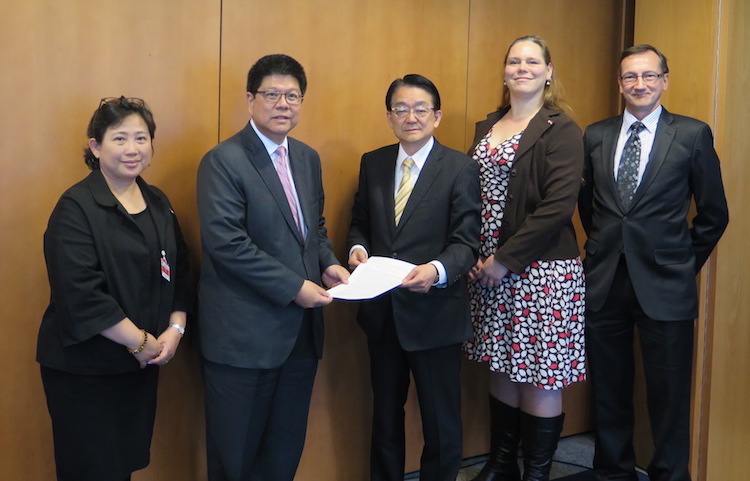Analysis by Jamshed Baruah
GENEVA (IDN) – The powerful message of a joint statement by diverse faith groups, calling for abolition of nuclear weapons, has been strongly backed by UN Secretary-General Ban Ki-moon’s reaction to President Barack Obama’s decision to visit Hiroshima on May 27.
Obama would be the first sitting U.S. President to visit the Japanese city during the G-7 economic summit that was annihilated by the first ever atomic bomb, dropped by the United States on August 6, 1945. It was followed by the second bomb that devastated Nagasaki three days later, killing a total of more than 200,000 people.
Ban “very much welcomes” Obama’s decision to visit Hiroshima, UN Spokesman Stephane Dujarric said. “For the secretary-general, one of the enduring lessons of Hiroshima is the need to abolish nuclear weapons once and for all,” he added.
“We would hope that the visit is again a global message on the need for nuclear disarmament, which is something that the Secretary-General is calling for,” the Spokesman said.
The remarks attributed to Ban were grounded in his profound commitment to a nuclear weapons free world. At the same time, these reminded of Obama’s historic speech in April 2009 in Prague, in which he pledged to rid the world of nuclear weapons. His presidency, Obama declared, would see “America’s commitment to seek the peace and security of a world without nuclear weapons”.
The interfaith joint statement issued at the start of the second session of the 2016 Open-ended Working Group (OEWG) from May 2 to May13 in Geneva highlighted the moral and ethical imperatives for the abolition of nuclear weapons. The OEWG is purported to taking forward multilateral nuclear disarmament negotiations.
The Group was convened by the United Nations General Assembly based on a resolution adopted in December 2015 to substantively address concrete effective legal measures, provisions and norms needed to attain and maintain a world without nuclear weapons. Its first session was held in February 2016.
The statement, endorsed by nearly 35 faith groups and individuals, was presented to OEWG Chair, Ambassador Thani Thongphakdi of Thailand on May 3. Its significance lies in the fact that since the atomic bombings of Hiroshima and Nagasaki in 1945, the continued existence of nuclear weapons has “forced humankind to live in the shadow of apocalyptic destruction”.
Because their use would not only destroy the past fruits of civilization, it would also disfigure the present and consign future generations to a grim fate, declares the statement.
The statement adds: “Nuclear weapons are incompatible with the values upheld by our respective faith traditions – the right of people to live in security and dignity; the commands of conscience and justice; the duty to protect the vulnerable and to exercise the stewardship that will safeguard the planet for future generations.”
The joint statement focuses on three crucial issues its authors are urging the OEWG to address:
– Heed the voices of the hibakusha (atomic bomb survivors) urging the abolition of nuclear weapons, whose suffering must never be visited on any other individual, family or society, by reaffirming that the humanitarian impact of nuclear weapons at the core of all nuclear disarmament efforts;
– Continue to call upon all states to participate in the OEWG and subsequent processes in order to fulfil their obligations to pursue in good faith and bring to a conclusion negotiations leading to nuclear disarmament;
– Outline in its report to the UN General Assembly, with the maximum degree of detail, a legal framework that will facilitate the prohibition and elimination of nuclear weapons under strict international control, which should be negotiated without delay in a form open to all states and blockade by none.
Sources close to faith groups said that three eminent faith organisations – PAX, the Soka Gakkai International (SGI) and the World Council of Churches (WCC) – had taken the lead in drafting the statement titled Faith Communities Concerned about the Humanitarian Consequences of Nuclear Weapons.
“It is our sincere hope that the discussions during the OEWG will pave a concrete roadmap leading to ‘the beginning of the end’ of the nuclear weapons age,” said Hirotsugu Terasaki, Executive Director of Peace and Global Issues of the SGI.
“We encourage all participants to begin from the foundation of moral, ethical and humanitarian perspectives. Our opposition to nuclear weapons must be bigger than words, and should be made binding through a new legal instrument prohibiting them once and for all,” added Susi Snyder, Nuclear Disarmament Programme Manager for PAX.
Explaining the WCC’s stance, Dr. Emily Welty, Acting Moderator of the WCC Commission on International Affairs said: “Our deepest held convictions and faith call us to reject security that is dependent on the threat of nuclear weapons. They should be seen as a sinful misuse of our resources.”
The statement builds on previous interfaith statements on the humanitarian consequences of nuclear weapons issued in April 2014 in Washington DC, December 2014 in Vienna and May 2015 in New York. [IDN-InDepthNews – 11 May 2016]
Related article: Campaign for a Nuclear Weapons Free World Intensifies
IDN is the flagship of International Press Syndicate.
Photo: OEWG Chair Ambassador Thani Thongphakdi (second from left) receiving an interfaith statement on May 3 from representatives of PAX, the SGI and the WCC. From right to left: Peter Prove of the WCC, Susi Snyder of PAX and Hirotsugu Terasaki of the SGI.


